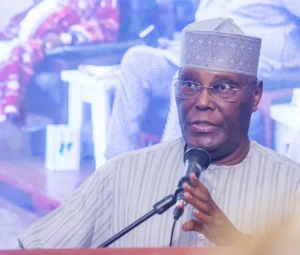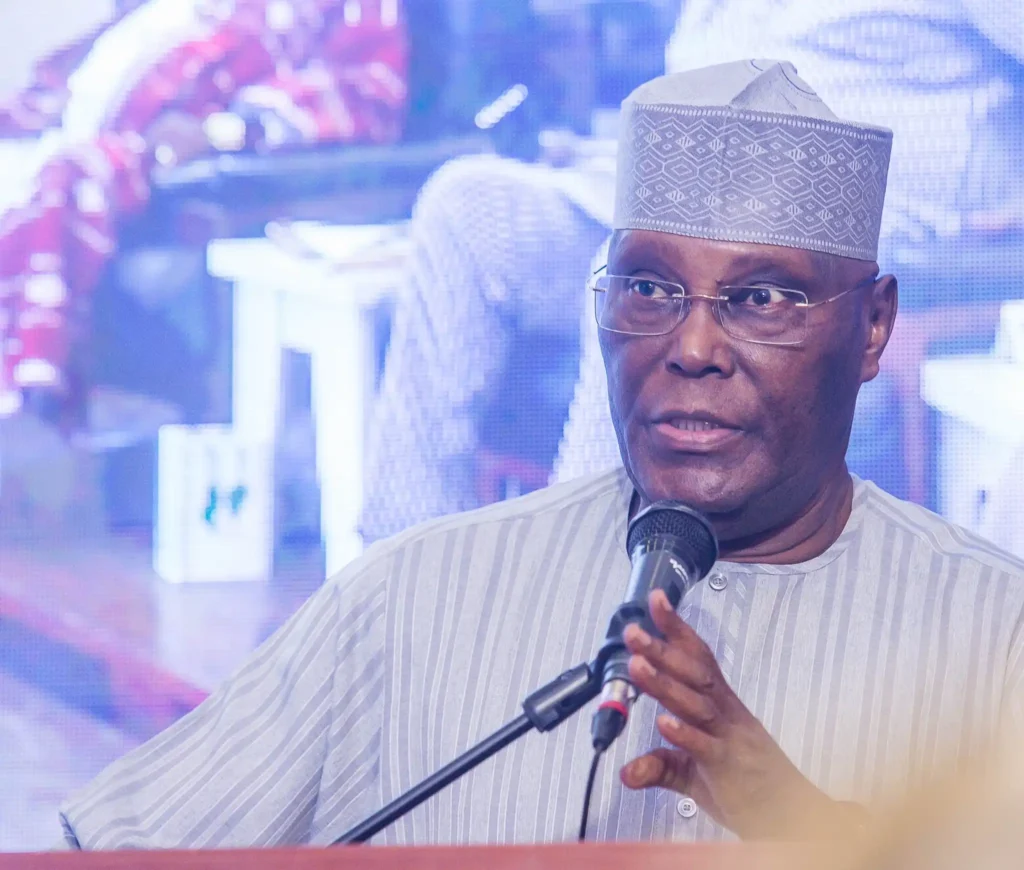The Peoples Democratic Party (PDP) held its much-anticipated presidential primary election at the MKO Abiola Stadium in Abuja, culminating in the emergence of Atiku Abubakar as the party’s flagbearer for the 2023 general elections. The former Vice President defeated a competitive field of aspirants in what political analysts described as one of the most charged and high-stakes primaries in the party’s history.
Atiku, who had previously run for president five times, secured 371 votes, outpacing his closest challenger, Governor Nyesom Wike of Rivers State, who garnered 237 votes. Other notable contenders, including former Senate President Bukola Saraki and Akwa Ibom Governor Udom Emmanuel, trailed behind.
With this win, Atiku Abubakar became the PDP’s presidential nominee for the sixth time, reinforcing his status as a dominant figure in Nigeria’s political arena and positioning him for a rematch against the ruling All Progressives Congress (APC), from whom he narrowly lost the 2019 general election.
Tambuwal’s Surprise Withdrawal Turns the Tide
One of the most decisive moments of the night came when Governor Aminu Tambuwal of Sokoto State, a key contender in the race, withdrew his candidacy just before voting began and declared his support for Atiku. Tambuwal’s withdrawal, which drew thunderous applause from the arena, proved pivotal, swinging votes that were likely headed for other aspirants directly into Atiku’s column.
Tambuwal, while addressing delegates, emphasized the need for unity and strategic decision-making. He described his action as “a sacrifice for the greater good of the party.” Political observers noted that this last-minute alliance significantly reshaped the trajectory of the primaries, underscoring the enduring importance of backroom negotiations in Nigerian politics.

Delegate Dynamics: How Atiku Secured the Numbers
The PDP presidential primaries were contested by 14 aspirants, but the race was widely seen as a two-man battle between Atiku Abubakar and Nyesom Wike. Despite Wike’s aggressive campaign across the country and considerable financial influence, Atiku’s long-standing political network, national reach, and late-stage alliance with Tambuwal helped deliver a decisive edge.
Delegates from Northern states, who made up a substantial portion of the voting pool, largely favored Atiku. His deep-rooted relationships within the party, dating back to his days as Vice President under President Olusegun Obasanjo, gave him a tactical advantage in consolidating support across multiple geopolitical zones.
In contrast, Wike, despite his vocal advocacy for Southern representation and party loyalty, struggled to expand his influence beyond the South-South and parts of the Southeast.
A Heated Campaign Trail and the Politics of Zoning
The build-up to the PDP primaries was marked by controversy over the party’s zoning arrangement. While many southern stakeholders insisted that power should rotate to the South after President Muhammadu Buhari’s tenure, the PDP’s final decision not to zone the presidency opened the race to all regions. This allowed Atiku, a Northerner from Adamawa State, to vie for the ticket without constitutional or structural hindrance.
The debate over zoning created visible tension within the party, particularly among governors from the South who felt marginalized. Governor Wike emerged as the most vocal proponent of Southern representation, often accusing the party’s northern bloc of hijacking the process.
Despite the internal rift, the party leadership pushed forward with an open primary, arguing that electability and national unity should trump regional sentiment. In the end, Atiku’s cross-regional appeal won out over calls for a strictly zoned candidacy.
Atiku Promises Unity, Economic Revival, and Security Reform
Following his victory, Atiku Abubakar took the stage to express gratitude to delegates, party leaders, and fellow aspirants. He called for immediate reconciliation and unity, emphasizing the need to close ranks ahead of the 2023 general election. He described the primary not as a battle between enemies, but as a contest among brothers.
“I am honored and humbled by the trust you have placed in me,” he said. “The PDP is the only party that can rescue Nigeria. Together, we must rebuild our nation’s economy, restore security, and unite a deeply divided country.”
Atiku also praised Governor Tambuwal for his sacrifice, calling it “an act of patriotism and loyalty.” He urged other aspirants to join forces with him in the fight to unseat the APC, whom he blamed for Nigeria’s economic struggles, worsening insecurity, and rising unemployment.
Reactions Across Political and Social Circles
Atiku’s victory sparked mixed reactions across the country. Supporters celebrated his return as the PDP’s standard-bearer, hailing his experience, national name recognition, and economic expertise. Many noted his business background and his performance as head of the National Economic Council during the Obasanjo administration as critical assets for a nation grappling with inflation and fiscal instability.
However, critics questioned the PDP’s decision to nominate a Northerner, warning that it could cost the party support in the South. Some civil society groups and southern leaders argued that the PDP had missed an opportunity to demonstrate its commitment to equity and inclusiveness by rotating power to the South.
Nevertheless, Atiku’s campaign team wasted no time in shifting into gear, launching immediate outreach efforts to bring aggrieved party members back into the fold and prepare for what promises to be one of Nigeria’s most fiercely contested presidential elections.
Looking Ahead: The Road to 2023
As the PDP’s presidential flagbearer, Atiku Abubakar will now face a formidable challenge in the 2023 general elections. His main rivals are expected to include Bola Ahmed Tinubu, the candidate of the ruling APC, and Peter Obi, the Labour Party nominee who had earlier withdrawn from the PDP race to run on a more populist, youth-centered platform.
While Atiku brings experience and political clout, he will also have to battle the perception of being a political veteran in a country where many citizens, especially young voters, are hungry for fresh leadership. Additionally, the rise of third-party forces and social media activism could fragment the traditional two-party dominance in unexpected ways.
Still, with a unified PDP behind him and years of political capital at his disposal, Atiku Abubakar is poised to mount a serious challenge for Nigeria’s top office—one that could redefine the country’s political trajectory in the years ahead.







